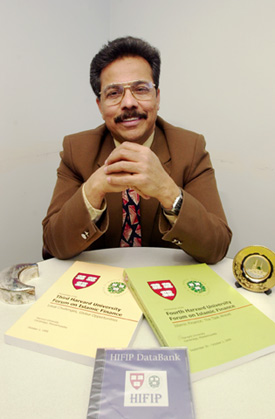Seminar explores Islamic finance
Westerners learn basics about growing practice

The U.S. Treasury Department tapped into Harvard’s scholarly expertise last Friday (April 26) when about 100 government officials attended a seminar in Washington titled “Islamic Finance 101.”
The seminar briefed staff from U.S. banking regulatory agencies, Congress, the Treasury Department and other parts of the Executive Branch about the segment of the international financial community that conducts its transactions according to Islamic law.
The seminar was chaired by Samuel Hayes, the Jacob H. Schiff Professor of Investment Banking Emeritus at Harvard Business School, co-author of the book “Islamic Law and Finance: Religion, Risk and Return” with Frank Vogel, the Custodian of the Two Holy Mosques Adjunct Professor of Islamic Legal Studies at Harvard Law School.
Treasury Under Secretary John B. Taylor, who delivered an introductory talk, said that the seminar’s inception occurred when Treasury Secretary Paul O’Neill visited Bahrain, the hub of the Islamic financial world, and participated in a roundtable discussion on Islamic financial practices hosted by Citibank Bahrain’s Islamic Investment Bank.
“The secretary wanted to make sure that we hosted a similar event in the United States to ‘demystify’ Islamic banking for our colleagues in Washington who may not have exposure to this topic,” Taylor said.
According to Taylor, the government’s efforts to combat terrorism on the financial front played a part in O’Neill’s decision to educate his department about Islamic finance, although the secretary makes a clear distinction between mainstream Islamic financial institutions and organizations that funnel money to terrorist groups.
“We need to understand how these legitimate institutions operate so that we can help strengthen them and prevent terrorists from abusing these institutions,” Taylor said.
O’Neill’s office contacted S. Nazim Ali, director of operations for the Harvard Islamic Finance Information Program, which collects and disseminates data on the subject. Ali, Hayes, and Thomas Mullins, associate director of the Center for Middle Eastern Studies, helped to set up the seminar, which, in addition to the Harvard participants, included several presenters from Islamic financial institutions.
Islamic financial practices follow Sharia, Islamic law based on the Koran. The law specifically prohibits the receipt or payment of interest and any transaction that involves gambling or speculation, a category which includes futures contracts, interest rate hedging, and other financial arrangements common in the West.
In lieu of interest, Islamic institutions pay investors a share of their profits. Making a profit is not prohibited under Islam. But Muslims believe that financial relationships should be equal rather than hierarchical. Thus, profit sharing is preferable to interest, which implies the unequal relation of debtor to creditor.
According to Hayes, the amount of wealth under professional management in the Islamic financial sector is about $200 to $300 billion, a fairly small quantity in comparison with the global capital market, but still a significant and growing niche.
In addition to Islamic financial institutions, estimated to be about 200 worldwide, many Western banks and investment firms, including Chase Manhattan, Goldman Sachs, Wellington Global Administrator, and ABC Investment & Services Co., have added Islamic finance divisions. Other institutions provide Islamic windows for Muslim customers.
Hayes’ interest in Islamic finance began in the early 1980s when he started studying capital flows in the Gulf area in relation to increases in oil prices. He wrote a number of articles on this topic, which led to the intensive six-year study he undertook with Vogel and to the publication of their book. Hayes has also participated in the annual forum on Islamic finance, organized by the Center for Middle Eastern Studies and the Islamic Finance Information Program. The fifth of these forums took place at Harvard, April 6-7.
According to Hayes, the events of Sept. 11 and the the war on terrorism have accelerated interest in Islamic finance, although academic interest in the subject began well before the present crisis.
“Sept. 11 was certainly a wake-up call as to the importance of Islam in world affairs,” Hayes said. “People have become much more aware of the activities of Muslims, so I think Sept. 11 has had some impact, but our study of this area has been ongoing for 15 years.”




